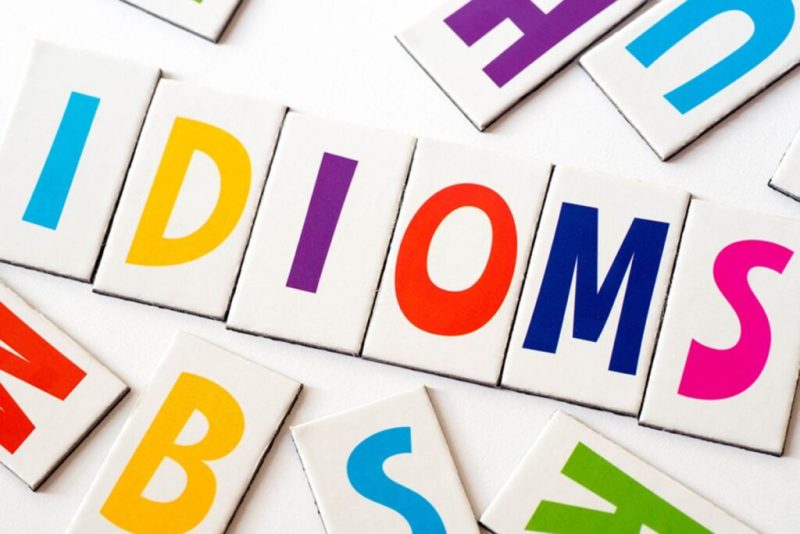There’s no doubt that idioms and expressions, which seem to be abundant in most or all languages, play an important role in colouring the language and creating interesting images. An idiom is typically a group of words (though it can sometimes be a single word) that express an idea whose meaning can’t be deduced from just looking at the words themselves. For example, if we take the common idiom ‘over the moon’ and try to take it literally (i.e. following the words), it would mean that the person was actually high up above the Earth (approximately 240,000 miles for those who are interested).
However, the idiom actually means that the person is very happy, so if you got married, experienced the joy of your child being born or got a promotion at work, you might say ‘I’m over the moon!’. The way to understand this is that if a person is ‘up’, they are happy. There is an informal phrase in English, ‘up for it’, which expresses the idea that you are enthusiastic about something that’s about to happen, for example a sports match, particularly if it’s a challenge.
Idioms similar to ‘over the moon’ are ‘on cloud nine’ and ‘in seventh heaven’. Although the origins of a lot of idioms and expressions are disputed, it appears that ‘cloud nine’ comes from the Buddhist idea that because 9 is the highest single-digit number, it is the highest spiritual plane that can be reached. ‘Seventh heaven’ is apparently the highest of the 7 heavens of Islamic and Cabalist doctrine, so we can see the logic here in both cases. As well as these, you could also be feeling ‘on top of the world’, with the same idea applying.
Similarly, just as up is good, down is bad in the word of idioms. If you think of ascending to heaven as being very good, and descending to hell as very bad, it will help you remember. So if you are feeling a bit ‘down’, you’re not feeling too happy, and the idiom ‘down in the dumps’ expresses this idea with a little bit of imagery to make the phrase more vivid. As with many idioms, there is actually an incorrect use of the language here because the plural ‘dumps’ doesn’t exist in common speech, but think of the world of idioms and expressions as a colourful one where the normal rules are relaxed and your imagination can ‘run riot’ (there’s a bonus idiom for you!). The Shakespeare play ‘The Taming of the Shrew’ uses the phrase ‘in the dumps’, so as with many words or phrases in English we have ‘The Bard’ to thank (or blame) for it.
The word ‘dump’ can mean to throw something away and ‘the dump’ is also an informal way to describe a ‘refuse centre’, which is basically a place where you can deposit all the rubbish from your house that you want to get rid of. Imagine huge piles of trash and that might convey the way a very sad person is feeling. The phrase ‘to get dumped’ is also a colloquial way to say that someone finished a relationship with you, giving the sense that you were thrown away like a piece of rubbish.
It is of course impossible to go through the hundreds of idioms that exist in English, but what we could do is look at a few groups of them.
Idioms And Expressions With Animals

A ‘bookworm’ (an example of a single-word idiom) is a person who reads a lot of books.
If you are ‘chicken (or a chicken)’, you are afraid of things.
An ‘early bird’ is someone who likes getting up early and generally feels fresher in the morning, while a ‘night owl’ is the opposite, a person who is ‘full of beans’ in the evening and night.
A ‘pig-headed’ person is stubborn and will only do things the way they want to, despite conflicting evidence or good advice.
If you are doing ‘the donkey work’, it means you’re doing the difficult and unglamorous tasks (just like a donkey having to transport heavy items for hours on end).
If you receive ‘the lion’s share’ of credit or profits, you receive the majority of something, just like the king of the jungle would claim.
If you ‘smell a rat’, you feel like something is not quite right, for example that you might be the potential victim of a scam. Being in a tourist place and being given a scratch card that magically wins you a prize is a good example of this.
Finally, if you are very proud and pleased with yourself, you feel like ‘the cat that got the cream’.
Idioms That Comment On People/Relationships
If someone is ‘the man/woman of your dreams’, you probably ‘love them to bits’, and maybe you ‘fell head over heels in love’ with them.
On the other hand, if someone ‘gets on your nerves/up your nose’, you probably have less affection for them. Picture yourself in an office working next to someone who complains all the time, ‘could talk the hind legs off a donkey’ (talks incessantly) or, worse still, whistles all day!
A person who is very good with words, for example a charismatic salesperson, has ‘the gift of the gab’, while a ‘rough diamond’ is someone who doesn’t make a great impression on the outside but is a good person on the inside.

If you ever see ‘gold’ in an idiom, it’s always good. Therefore, someone with ‘a heart of gold’ is a very nice person, and parents or those teaching kids will always hope that the children will be ‘as good as gold’, a simile which means well-behaved.
Great relationships don’t always start well. I first met the person who has become my closest friend when we nearly crashed into each other in our cars and had a huge argument (known as ‘road rage’). In this case, you could say that we ‘got off on the wrong foot’.
Interested in improving your English?
Sign up for a 30-minute trial lesson
Interested in improving your English?
Sign up for a 30-minute trial lesson
Idioms and Expressions Using The Elements
Water
If a politician introduces some very unpopular legislation, there might be a ‘storm of protest’. When there is a major war in an underdeveloped country, one common consequence is that refugees start ‘flooding into’ the more-developed countries. Returning to politics, if someone who was popular suddenly becomes unpopular (or vice versa), you might say that ‘the tide is turning’. Finally, if a small amount of money is given to solve a major problem, or indeed if Bill Gates loses $1000 in a casino, you could say that it’s ‘just a drop in the ocean’.
Fire
If your relationship is passionate but also argumentative, you might say that it’s ‘fiery’, and it probably includes a ‘blazing row’ quite often. Interestingly though, if you ‘get on like a house on fire’ with someone, it doesn’t mean that you have a bad relationship full of ‘fireworks’. It actually means that you have a very good relationship with them. The origin of this one is difficult to find, but I suppose that a fire that starts in a house would develop quickly and be very strong (with all that lovely wood and paper to help it along), and maybe your relationship would also be strong.
Idioms Using Sport

If you get yourself into ‘a tight corner’, for example a public figure who has been caught lying on TV, you are in a difficult situation and have very little space to move, just like in a football match. In addition, politics often involves ‘foul play’, where someone doesn’t follow the rules. You hope for a ‘level playing field’, where the rules are the same for everyone, but someone might ‘move the goalposts’, which means that they change the rules halfway through a process, for example a legal trial.
In conclusion (or should I say ‘in a nutshell’), this wonderful world of idioms, not to mention expressions, phrasal verbs, proverbs and the rest, is an interesting one where the normal rules don’t quite apply, and it’s worth learning some of them to give your speaking and writing a certain panache and style. Even if it doesn’t seem like your ‘cup of tea’, be persistent, ‘keep your head’ and soon you’ll be ‘flying high’!

This article was written by Break Into English’s online teacher and blog contributor Anthony Rotunno.








